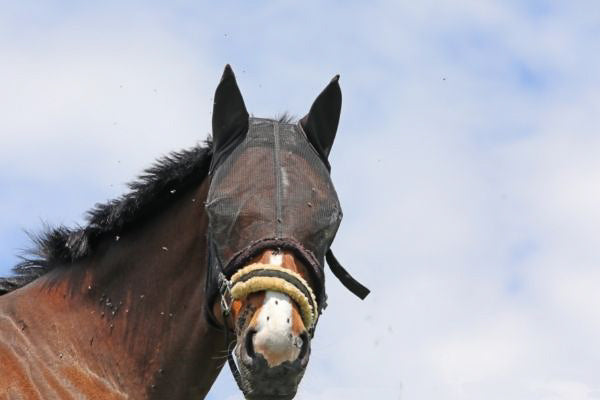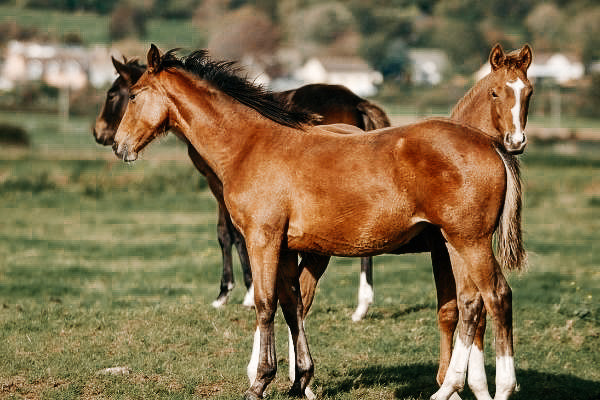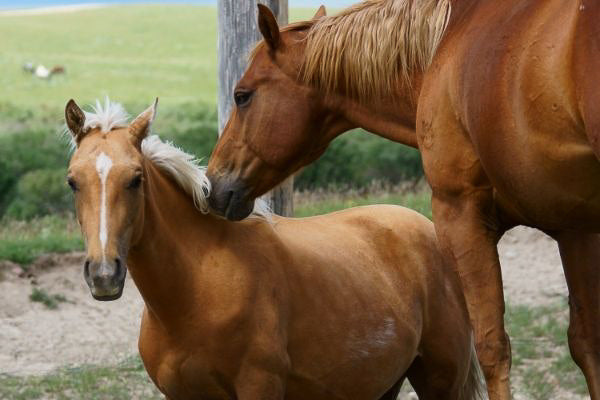
DIY fly spray – natural help against annoying pests
Blue skies and bright sunshine make our riders' hearts beat faster. In this weather you'll definitely want to get started right away, right?
Unfortunately, the horses can only share our euphoria for warm spring and summer weather to a limited extent. Reason? Exactly, the whirring, buzzing, buzzing martyrdom. Black flies, horsefly, stable gnats, etc. seem to have just been waiting for us to plan a “really relaxed” ride with our horse.
Even on the riding arena, the pests constantly chase after the animals. But just a riding hall isn't the solution, is it? And even there there are still very stubborn critters that seem to find their way inside with ease. The horse is annoyed. It beats its head and tail, stomps its feet and, in the worst case, scratches itself.
Clear statement:
A preventative fly protection for the horse is necessary!
Of course you can do a lot with a fly mask on your horse and an air-permeable mosquito blanket, but when training with a fly blanket, the horse will quickly start to sweat. This is therefore recommended for a quiet ride.
Fact is:
Gadflies and mosquitoes look for open places. And they find them. Promised! Now more drastic measures must be taken. The market offers a lot. Unfortunately, this fly protection for horses is expensive, often chemical and tends to have severe side effects. However, you don't have to do without spray protection.
The solution:
Prepare your own DIY fly spray. We have listed a few useful recipes for you to make yourself. With natural ingredients, of course!
Declare war on mosquitoes with the garlic power spray
You need:
- approx. 10 -12 garlic cloves
- 1-2 bags of black tea
- a few cloves
- 1 liter of water
Preparation:
Crush and mince the garlic. Boil the water well with the tea bags, cloves and garlic. Afterwards you can either pour it through a sieve or let it steep in cold water for another 1-2 days (increases the effect!) and then strain it out. Pour into a spray bottle. Complete.
ATTENTION: Not suitable for gray horses or very light horses, as the spray has a brownish color!!!!! As you can probably imagine, the smell is very, very intense. A change of clothes after riding is therefore an advantage.
Vinegar Oil DIY Fly Spray
You need:
- 0.5 liters of light vinegar
- 0.5 liters of water
- 10 ml geranium oil (cinnamon leaf, citronella or catnip oil also works)
- 50 - 100 ml black cumin oil
Tip:
You can find most oils in the pharmacy, drugstore or online.
Preparation:
Pour everything into a large, empty PET bottle and shake well. If you have a spray head attachment, you can attach it to it straight away. However, the bottle is then relatively heavy and unwieldy. It's better to put it in your locker and only fill a small extra bottle with as much as you need for the next few days or your ride. This makes handling much easier for you.
Tip:
In the drugstore you can get very small sample bottles (e.g. b disinfectant spray). Once used up and washed out, you can use them on the go. This means you always have a dose of insect repellent ready for your horse if the effect wears off during training or riding.
Eczema - make your own fly spray
Especially horses that react strongly to black flies and horsefly with allergic sweet itch need a mild but effective remedy against these beasts. Here too, you can make your own fly spray to give your sweetheart some relief
Unfortunately, you will hardly be able to do without a fly mask on your horse. A well-ventilated fly rug will also be a daily companion for the horse if it reacts strongly to the mosquitoes.
But you can do good for your horse by grooming it every day. A troubled horse really enjoys a gentle massage. You are welcome to take a look at our ANIMALON products. Due to their flexibility, many are exactly the right thing for sensitive eczema and can be a great addition to fly protection for horses.
Now back to the DIY fly spray!
You need:
- 0.5 liters of apple cider vinegar
- 0.5 liters of water
- 10 ml neem oil
- 5 ml tea tree oil
- 200 - 300 ml black cumin oil
Preparation:
Very easy. Pour everything directly into the spray bottle and shake well. Complete.
Tip 1:
As additional help from within, you can also give your pet 20 ml of black cumin oil per day in their food. Important: Only use cold-pressed “Nigella Sativa”! If you don't want to feed oil, black cumin seeds may be an alternative for you.
Tip 2:
If areas of skin become inflamed, you can gently massage the affected areas with organic coconut oil. This relieves the itching, has an antibacterial effect and actually scares away the buzzing pests. The lauric acid it contains effectively keeps mosquitoes away from already irritated skin and positively supports wound healing.
Important: Unfortunately, these home remedies may not be sufficient for severe eczema. The following applies here: consult your veterinarian!
Do it yourself - conclusion
Making your own fly spray is not rocket science. With just a little effort, very productive amounts of mosquito repellent can be produced. On the one hand it's good for your wallet, on the other hand it's good for the horse.
Thanks to natural ingredients, you don't have to worry about side effects. So it doesn't take much to make summertime easier for your horse. Tea tree oil, black cumin, vinegar, etc. are ideal for this.
If you treat your pet to an extra dose of grooming, your horse is guaranteed to neigh happily when you enter the stable.
Discover more posts

Tips for training young horses – a good start in life counts!
Nowhere are more foundations set for a horse's future path than in young horse training. Encouraging the “young wild ones” in their spirit right from the start is a special focus in equestrian...
Continue reading
The horses – when the mare’s hormones make themselves felt!
A loud squeak echoes across the paddock. Spring, with warmer temperatures and more daylight, noticeably brings out the mare's hormonal balance again. Many horse owners then talk about the anim...
Continue reading
